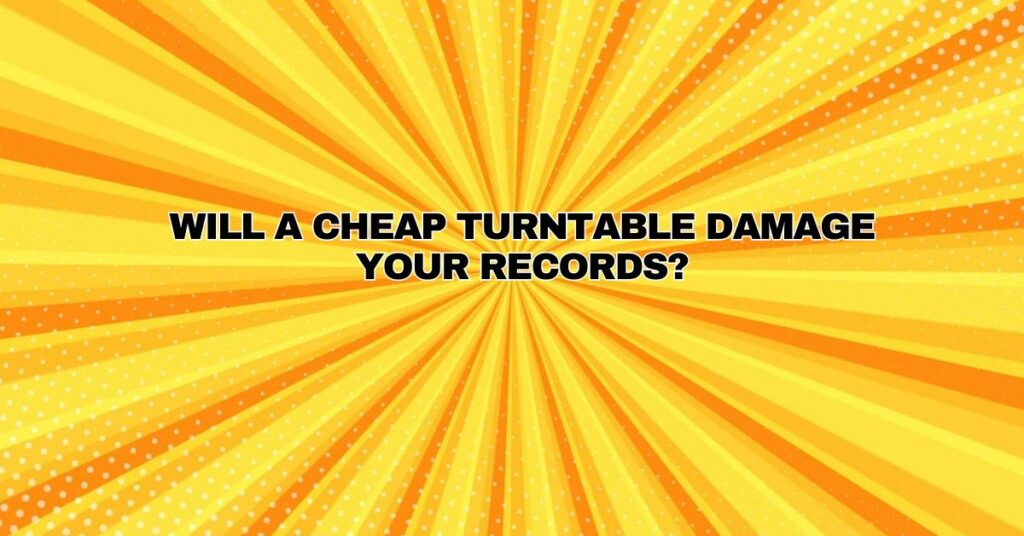Vinyl records have experienced a resurgence in popularity, attracting both seasoned audiophiles and newcomers to the world of analog music. While the allure of vinyl lies in its warm, immersive sound and tactile engagement, the choice of turntable can significantly affect your vinyl listening experience. In this article, we’ll examine whether cheap turntables have the potential to damage your valuable vinyl records and explore the factors to consider when choosing the right turntable for your collection.
The Appeal of Vinyl Records
Vinyl records offer a unique and nostalgic listening experience, with many enthusiasts valuing the tactile interaction of handling records and the analog warmth of the sound. A well-maintained vinyl collection can provide decades of musical enjoyment and appreciation for album art and liner notes.
The Impact of Turntable Quality
The turntable you choose to play your vinyl records can influence both the sound quality and the condition of your records over time. Cheap turntables, often characterized by their budget-friendly price tags, may raise concerns about their potential impact on your vinyl collection:
Sound Quality: One of the primary concerns with cheap turntables is their sound quality. Lower-quality components, including subpar cartridges and tonearms, can result in inferior audio reproduction. While vinyl inherently provides a unique listening experience, a cheap turntable may not do justice to the nuances and details present in your records.
Tracking Force and Stylus Quality: Inexpensive turntables may lack precise tracking force adjustment mechanisms, leading to excessive stylus pressure on your records. This can accelerate record wear and result in audio distortion and damage over time. Additionally, cheap turntables may come with substandard styli that can further compromise sound quality.
Build Quality: The build quality of cheap turntables can vary significantly. Some may feature lightweight and flimsy construction that is prone to vibrations, affecting playback stability and sound quality. Higher-quality turntables typically employ better materials and engineering to minimize vibrations and resonance.
Record Wear and Potential Damage: The combination of inadequate tracking force control and lower-quality stylus materials can lead to increased record wear and the risk of permanent damage, such as groove distortion and skips.
Anti-Skate and Tonearm Quality: Anti-skate mechanisms, which help maintain the stylus’s proper alignment in the record groove, may be lacking or poorly implemented in cheap turntables. This can result in tracking errors and increased wear on one side of the groove.
Choosing the Right Turntable
While it’s essential to be cautious of the potential drawbacks of cheap turntables, it’s also important to recognize that there are affordable options that offer reasonable performance without compromising record integrity. When selecting a turntable, consider the following factors:
- Budget: Determine your budget, but be willing to invest in a turntable that strikes a balance between affordability and performance. Remember that the turntable is a critical component of your vinyl playback system.
- Brand and Model: Research reputable brands and models known for their quality and positive user reviews. Established turntable manufacturers often produce models that cater to various price ranges.
- Tracking Force Adjustment: Ensure that the turntable provides accurate tracking force adjustment to protect your records from excessive stylus pressure.
- Cartridge Quality: A good-quality cartridge and stylus are essential for optimal sound quality and record preservation. Consider turntables that allow for cartridge upgrades if necessary.
- Build Quality: Choose a turntable with solid construction to minimize vibrations and resonance during playback.
- Anti-Skate and Tonearm: Check if the turntable includes an effective anti-skate mechanism and a well-designed tonearm for stable and accurate tracking.
- Maintenance: Be prepared to properly maintain your turntable, including stylus and record cleaning, to extend the life of your records.
Conclusion
While cheap turntables may carry certain risks related to sound quality and record wear, it’s possible to find affordable options that offer reasonable performance without causing significant harm to your vinyl records. Careful consideration of the factors mentioned above and a commitment to proper turntable maintenance can help you enjoy the world of vinyl records without compromising their quality and longevity. Ultimately, investing in a mid-range or higher-quality turntable can enhance your vinyl listening experience and provide the best possible sound while preserving your cherished record collection.


